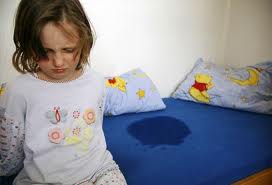Let‘s now look at all the signs and symptoms likely to reveal a thyroid weakness in children. This is not intended in any way to suggest prescribing thyroid hormones for the little ones, unless it is an absolute necessity of course, but rather to support thyroid function if need be. For example, it may be a matter of giving iodine, often deficient in children, just as long as the deficiency is clearly established by a urine test (as I am not in favour of giving iodine blindly). Let’s also not forget the use of ultra sound of the thyroid to assist us to identify an abnormal gland (one lobe only) or hypotrophy (meaning too small, less than 2 to 3 ml per lobe).
The first thyroid doctors, a century ago, knew well (in reality better: there were no blood tests!) the clinical aspect of hypothyroidism, especially in children. They are constipated, with bouts of diarrhoea, when blocked stools ferment to the point of making the cork 'pop' by its liquefaction. Their abdomen is abnormally sensitive, even painful at the right iliac fossa (the ileocecal valve bursting with intestinal yeasts). The tonsils and / or adenoids appear inflamed, enlarged to the point of making breathing and swallowing difficult.
 Hypothyroidism causes looseness of tendons explaining diminished tendons reflexes (these being the ones that are evaluated with a small hammer). It is therefore not surprising to find some flat feetin children suffering from hypothyroidism. Thyroid hormone powerfully activates growth so we wouldn’t be surprised to find a growth delay: a child too small for his age (according to the height and weight curves) should arouse suspicion about the possibility of hypothyroidism, even if there are no other symptoms present. This is a diagnosis not to overlook, because correction could restore proper growth.
Hypothyroidism causes looseness of tendons explaining diminished tendons reflexes (these being the ones that are evaluated with a small hammer). It is therefore not surprising to find some flat feetin children suffering from hypothyroidism. Thyroid hormone powerfully activates growth so we wouldn’t be surprised to find a growth delay: a child too small for his age (according to the height and weight curves) should arouse suspicion about the possibility of hypothyroidism, even if there are no other symptoms present. This is a diagnosis not to overlook, because correction could restore proper growth.
Nocturnal enuresis (bedwetting) is a very interesting sign: these children most often sleep very deeply and the wakening normally triggered by the feeling of a full bladder (especially given the frequent need to urinate or pollakiuria) doesn’t happen. So many family dramas could be avoided if only in all those cases a proper diagnosis was made early….
 Maternal hypothyroidism can have adverse effects on the foetus and there is a strong relationship with a relative decline in IQ (compared to what would have happened under normal circumstances). Unfortunately also found in these undetected and untreated cases can be developmental brain disorders. Links with attention deficit and hyperactivity have been demonstrated and published. In an animal model (rats) where maternal hypothyroidism was induced via the administration of an anti-thyroid drug, the offspring displayed hyperactive type behaviour.
Maternal hypothyroidism can have adverse effects on the foetus and there is a strong relationship with a relative decline in IQ (compared to what would have happened under normal circumstances). Unfortunately also found in these undetected and untreated cases can be developmental brain disorders. Links with attention deficit and hyperactivity have been demonstrated and published. In an animal model (rats) where maternal hypothyroidism was induced via the administration of an anti-thyroid drug, the offspring displayed hyperactive type behaviour.
All the references for the publications cited in these blogs about the thyroid can be found under the heading “Conferences – Functional Hormonology – Thyroid” when you visit my website www.gmouton.com (free to download).
To finish this penultimate blog, let’s briefly discuss how to specifically identify hypothyroidism in the "fathers", by describing the male symptoms, especially as we will dedicate the next and final blog to all the manifestation of hypothyroidism occurring in the “mothers” (and believe me, an entire blog dedicated to this subject is necessary!).
Hypothyroid men will often complain of a low libido, premature ejaculation, or erectile dysfunction. These problems have typically driven biological research to examine the level of male sex hormones, therefore conspiring to completely miss an underactive thyroid. Even more interesting is the fact that the medical literature clearly attests that the correction of an underactive thyroid may improve all these “male” complaints…






